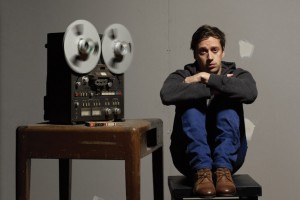On the Misconception of Oedipus | Malthouse Theatre
- September 8th, 2012
- Posted in Uncategorized
- Write comment

On prompting from Adelaide’s lady of blogging/twittery sass, Jane Howard, and casual agreement amongst my dear colleagues Alison Croggon and Cameron Woodhead I decided to spend my few unscheduled hours in Melbourne at the Malthouse to catch On the Misconception of Oedipus.
I was keen to catch some of Tom Wright’s work – and to see what Matt Lutton was up to – I had seen their respective works at the STC over the past few years and was keen to catch up on how the body of work was progressing and digressing – and if, as it is rumoured in Sydney – Melbourne’s theatre scene was all that different (especially in the mainstage context).
My relationship with Oedipus is cobbled together in fragments – showings, speeches from, jokes and re-tellings that hang in the creative consciousness, Igor Stravinsky’s Opera Oedipus Rex and the Symphony of Psalms, university Psychology Freudian reading lists and a thousand minute and momentary references.
For a quick refresher: http://en.wikipedia.org/wiki/Oedipus – but I doubt you need it… having your own version/impression helps in the reading of the production.
The story for me has always been one about the powerlessness of man – determinism wins out over freewill every time. And even when you use your free will it is really an instrument of determinism. We are at the mercy of fate/Gods.
Of course it is hardly surprising that artists keep this story fresh and these ideas constantly churning over – they are, after all at the mercy of fate/gods in the form of funding/space/time/audiences.
A small note I’m handed before I take my seat states,
“This is not the famous Oedipus play by Sophocles or Seneca. This is effectively a prequel. It examines the events before the plays begin. This chapter of the myth was never written down. Therefore we have frequently imagined our own version of events.”
In the smaller theatre, the stageholds a raised box small but able to hold three actors – like that of a shoebox diorama – but like that of a half completed house. Walls with plastered edges… basics. simple. One entrance onto stage – and the picture frame of the action like a big wooden TV screen – or a moving painting – actors contained within.
Three characters tell their version of the story – the beginning – the imagined past. A contemporary telling. What is interesting here in this contemporary telling is how scholarly and writerly the writing is – how smooth and poetic the text – echoing in Australian accent the cadence and rhythm of the poetry of Sophocles. We have ancient craft – writing – on show. If this is an experiment about story, it is VERY VERY traditional. But only initially. The action cracks into the visual telling of Oedipus killing his father and sleeping with his mother – in a non-poetic, non-linguistic presentation. The second half, the cute post-coital scuffing around of two lovers on a couch. Unwriterly. The moment that WAS written (by the ancients) has nearly been unwritten by the makers (Lutton/Wright/Atkinson).
I once saw a lecture on The Obscene by Steven Berkoff – who talked eloquently on the importance of imagination. How the horrific eye-plucking and rapes and murders of ancient plays were actions described in words, not enacted. Here we are in the contemporary work clustered by images of war, rape and other horrific acts of humanity – we have all sorts of images shown to us – 24 hours a day – advertising we are not in control of, news we feel is so sensationalized we are desensitized. Lutton’s production can’t help but give us some of what we’re missing of the original story. Abstracted. But present.
(Shall I quibble and therefore acknowledge it is then technically not a prequel? No. Wait. I already have.)
The MOST interesting part of this is about storytelling.The different conventions – the different perspectives the collisions and the overlaps. The concurrent themes and the abandoned perspectives. BUT on a big, wider-reaching philosophical level we are left really with the question which asks – How has Freud and modern psychology changed our (the audience and the makers) telling of stories.
How have our collective consciousness been coloured or instructed?
How has the rise of the individual (“if it’s meant to be it is up to me”) VS the decline of supersition or the denial of God/s changed that story?
How do we tell stories from ancient times, (and other landscapes, languages and cultures pulsing through them) in a way that greets our contemporary sensibility?
All great questions to wrestle.
I must admit I didn’t hold back in the post-show forum, gently interrogating the creators about their own personal perspective on determinism. I felt rather cheeky and annonymous as the spying out-of-towner.
And I’m still thinking about it – nearly 3 weeks on…